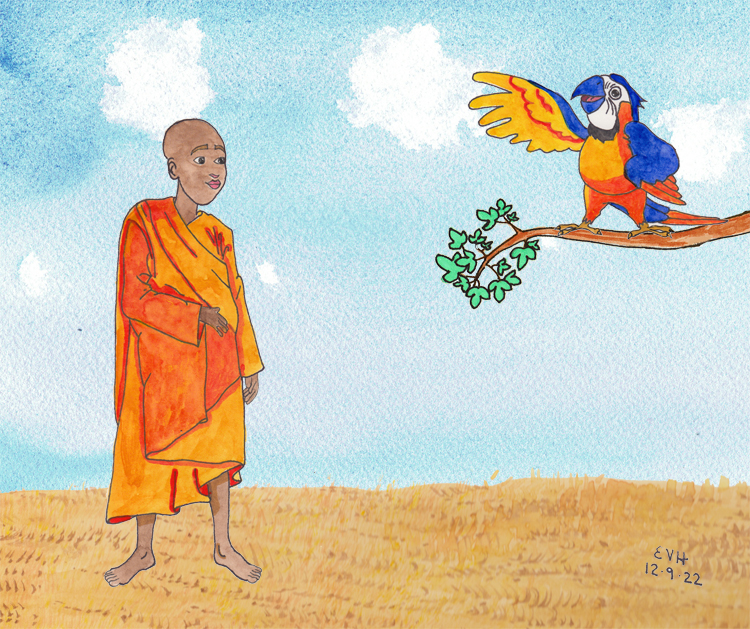
Jataka 393
Vighāsa Jātaka
The Remnants
as told by Eric Van Horn
originally translated by H.T. Francis and R.A. Neil, Cambridge University
originally edited by Professor Edward Byles Cowell, Cambridge University
This story is a little muddled, but I think you can tease out its meaning. There are monks who are indulging in sense pleasures. In particular the Buddha calls out their indulgence in food. He says that they are not satisfied with “remnants”—leftovers—which is what Buddhist monastics are always supposed to live on.
“Happy life is theirs.” The Master told this story while he was living in the East Garden. It is about some monks who were given to amusement and sensual pleasures. The great Moggallāna had shaken their dwelling and shamed them. The brothers sat discussing their faults in the Dharma Hall. The Master—being told what had happened—said to them, “They are not given to sense pleasures for the first time.” And then he told this story from the past.
Once upon a time when Brahmadatta was reigning in Benares, the Bodhisatta was Sakka. Seven brothers in a certain village of Kāsi seeing the defilement of sense desires had renounced them and become recluses. They lived in Mejjhārañña (a forest at the time of the Buddha), but they indulged in various kinds of sensual pleasures. They did not practice diligently and engaged in bodily pursuits. Sakka, king of the devas, said, “I will shame them.” And so he became a parrot, went to their dwelling place, and perched on a tree. There he spoke the first stanza to alarm them:
Happy life is theirs who live on remnants left from charity.
Praise in this world is their lot, and in the next felicity.
Then one of them—hearing the parrot’s words—called to the others, and then he spoke the second stanza:
Should not wise men listen when a parrot speaks in human tongue?
Hearken, brothers, ‘tis our praises clearly that this bird has sung.
Then the parrot—denying this—spoke the third stanza:
Not your praises I am singing, carrion-eaters. You hear me.
Refuse is the food you eat, not remnants left from charity.

Figure: “Not your praises, I am singing!”
When they heard him, they all together spoke the fourth stanza:
Seven years ordained, with duly shaven hair,
In Mejjhārañña here we spend our days,
Living on remnants. If you blame our fare,
Who is it then you praise?
The Great Being spoke the fifth stanza, putting them to shame:
Leavings of the lion, tiger, ravening beast, are your supply.
Refuse truly, though you call it remnants left from charity.
Hearing him the recluses said, “If we are not eaters of remnants, then who are?” Then he told them the true meaning of his words, speaking the sixth stanza:
They who give alms to priests and brahmins, wanting to satisfy
Eat the rest, ‘tis they who live on remnants left from charity.
So the Bodhisatta put them to shame and went to his own place.
The lesson ended, the Master taught the Four Noble Truths. Then he identified the birth: “At that time the seven brothers were the indulgent monks, and I was Sakka.”
